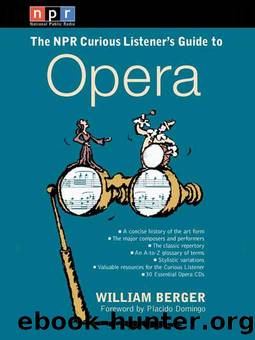NPR The Curious Listener's Guide to Opera by William Berger

Author:William Berger
Language: eng
Format: epub
Publisher: Penguin Publishing Group
SIX
The Performers
Ultimately, opera depends on the performers who bring it alive. Opera fans love to discuss singers, to a maddening degree sometimes. In fact, opera fans will discuss singers they have never heard, even on recording. The various attributes of a Farinelli (d. 1782) or a Malibran (d. 1828) are discussed as if they were on television the previous night. Of course, some of this is name-dropping, but there is more to it as well. Opera singers come to represent certain aspects (and certain antics) of the art that are difficult to describe, and become in this way bigger than life. It is therefore perfectly natural to refer to singers one could never have heard in the course of a conversation. Conductors, too, have reputations that outlive them, remembered for the art they created and helped others to create.
Below is an alphabetical survey of many of the singers—and the conductors—whose names are bandied about by opera fans as if they are old friends, and, in a sense, they are. The list is far from complete. It is meant to give a glimpse into the marvelous diversity of people who, at base, are the essence of this art form.
Claudio Abbado (1933– ): For years the reigning genius at Milan’s La Scala, famous for rich renditions of the standard repertory as well as successful forays into newer works, Abbado made the rare leap from opera to symphonic conductor, and has been chief conductor of the august Berlin Philharmonic for the past decade. His recordings from the 1970s are generally marvelous.
Marian Anderson (1897–1993): A contralto whose place in operatic history is assured more by what she did not sing than by what she sang. As an African-American woman in a time of segregation, Anderson was repeatedly denied entry into conservatories and instead studied privately. Since she could not work with opera companies, she became a noted concert artist, singing songs and arias primarily in Europe. Even booking concerts in the United States was difficult for Anderson, as she discovered in 1939 when the Daughters of the American Revolution refused to allow her the use of their Constitution Hall in Washington, D.C. First Lady Eleanor Roosevelt resigned from the D.A.R. in protest, and Anderson moved her concert to the Lincoln Memorial, where she sang before a rapturous audience of 75,000 people. Shortly afterward, she sang for King George V and Queen Elizabeth on their tour of the United States. Anderson’s long-delayed debut at the Metropolitan occurred in 1955 in Verdi’s Un ballo in maschera, but by that point Anderson was in no position to begin an operatic career. However, the indefatigable woman continued to give concerts for many years, and sang at President Kennedy’s inauguration in 1961. Anderson will be remembered not only for her uniquely rich voice, but for her exceptional spirit, which has made her an American icon.
Cecilia Bartoli (1966– ): One of the most interesting and controversial singers working today, Bartoli is a mezzo-soprano with an extraordinary command of coloratura technique.
Download
This site does not store any files on its server. We only index and link to content provided by other sites. Please contact the content providers to delete copyright contents if any and email us, we'll remove relevant links or contents immediately.
Periodization Training for Sports by Tudor Bompa(7329)
The MacArthur Bible Commentary by John MacArthur(4238)
The Body: A Guide for Occupants by Bill Bryson(3802)
The Sports Rules Book by Human Kinetics(3589)
What It Really Takes to Get Into Ivy League and Other Highly Selective Colleges by Hughes Chuck(3221)
Marijuana Grower's Handbook by Ed Rosenthal(3119)
The Sprouting Book by Ann Wigmore(3054)
Salt, Fat, Acid, Heat: Mastering the Elements of Good Cooking by Nosrat Samin(2658)
The Martian by Andy Weir(2611)
Classic by Mary Berry(2503)
The Bread Bible by Rose Levy Beranbaum(2472)
Sapiens and Homo Deus by Yuval Noah Harari(2416)
Harry Potter 4 - Harry Potter and The Goblet of Fire by J.K.Rowling(2416)
The Marketing Plan Handbook: Develop Big-Picture Marketing Plans for Pennies on the Dollar by Robert W. Bly(2414)
Martha Stewart's Baking Handbook by Martha Stewart(2332)
50 Economics Classics by Tom Butler-Bowdon(2067)
Screenplay: The Foundations of Screenwriting by Syd Field(2058)
The Cambridge Grammar Of The English Language by Rodney Huddleston Geoffrey K. Pullum(2048)
The Plant Paradox by Dr. Steven R. Gundry M.D(2040)
